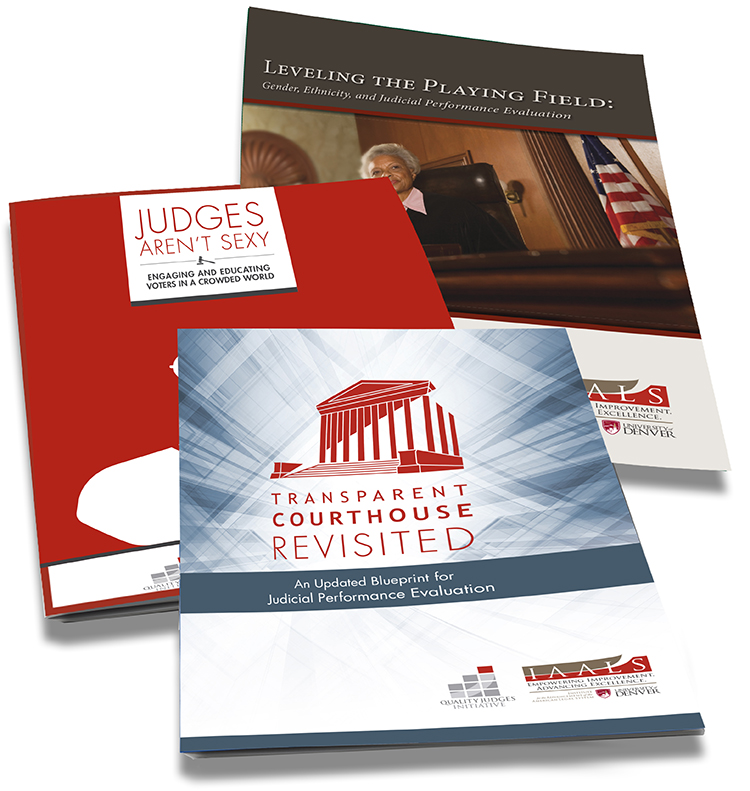
Most Americans undergo job evaluations, and there is no reason why judges should not do the same. Judicial performance evaluation (JPE) processes were first developed in the 1980s and provide a foundation for states to assess the job performance of judges. Today, JPE programs continue to focus on the right goal of holding judges accountable for job performance based on politically neutral qualities like impartiality, transparency and consistency rather than their rulings in cases. However, updating evaluation methods is essential to keeping JPE relevant and useful. Current JPE processes no longer fully capture the experience of modern court users, the needs of modern judges, or the expectations of modern voters. IAALS’ JPE 2.0 project will help JPE programs update their approaches to reflect modern realities, while remaining accurate, trusted, and relevant.

A Primer on JPE: This IAALS white paper discusses the general purposes and history of JPE; the various evaluation criteria, tools, and procedures used in JPE programs; the varying perspectives on JPE; and issues in the realm of JPE warranting focused consideration going forward. Read and download here.
July 2024: IAALS surveyed judges across eight states—Alaska, Colorado, Hawaii, Idaho, Massachusetts, New Mexico, Utah, and Virginia—to understand their perspectives on JPE processes in their states today, what is working well, and challenges with their programs. Our report, National Perspectives on Judicial Performance Evaluation, reveals their insights and sets the stage for our forthcoming recommendations to modernize JPE programs nationwide.
JPE programs advance several different important policy goals, including:
While JPE programs are state-specific, all adhere closely to the criteria that judges should be evaluated on the process of judging rather than specific case outcomes. More specifically, the criteria focus on qualities that anyone would demand of a good judge: excellent legal ability and legal knowledge, integrity and impartiality, strong communication skills, professional temperament, and high administrative capacity. IAALS’ research has highlighted a clear public consensus for this vision.
Despite their critical importance, JPE programs have suffered from waning enthusiasm in the past decade, with some critics expressing concern about the accuracy and validity of surveys and the lack of overall transparency in the process. Some critics outside the judiciary suggest that JPE programs fail to account for judicial discipline or judicial ideology. Additionally, changes in technology and society have altered the public’s perception of—and relationship with—today’s courts, and JPE programs must adapt. Even longstanding and well-regarded JPE programs need to update their approaches to remain accurate, trusted, and relevant.
JPE 2.0 represents an effort to address these issues, by thinking creatively about how to maintain the core goals of JPE while also being responsive to emerging best practices and legitimate concerns about antiquated techniques. With the assistance of a Task Force comprised of leaders of JPE programs around the country, IAALS will identify the issues and problems to be addressed by the next generation of JPE, conduct comprehensive research with courts nationwide, and publish new recommendations for modern JPE programs—creating an empirically based foundation for JPE 2.0.

Since its founding, IAALS has been at the forefront of efforts to improve and expand programs for evaluating the performance of state and federal court judges. We have earned a reputation as the “go to” group for research, recommendations, and practical assistance in the JPE field. We have accomplished this by serving, in a number of contexts, as a convener of JPE program administrators, judges, lawmakers, and scholars who are committed to promoting and ensuring effective judicial performance evaluation in states around the country.
IAALS continues to serve as an ongoing resource to lawmakers, fair courts advocates, and thought leaders interested in judicial selection issues, and as a conduit of information and research-based recommendations for judicial performance evaluation programs around the country.
As part of our O'Connor Judicial Selection Plan, we recommend that judges are evaluated near the end of their term by people who have contact with and knowledge of their performance. Diverse groups of people who use the court system are surveyed, such as attorneys, litigants, jurors, witnesses, court employees, law enforcement officials, and victims. The survey asks about the clarity and impartiality of judges’ rulings, and the way judges manage their cases and interact with others.
A judicial performance evaluation commission reviews the surveys and writes a summary of the findings, rating how well judges perform their responsibilities and whether or not judges are recommended for retention. The evaluation is then made available to the public in a timely fashion before the retention election.
As we develop our new recommendations for JPE 2.0, IAALS offers these prior recommendations for effective judicial performance evaluation (JPE):

